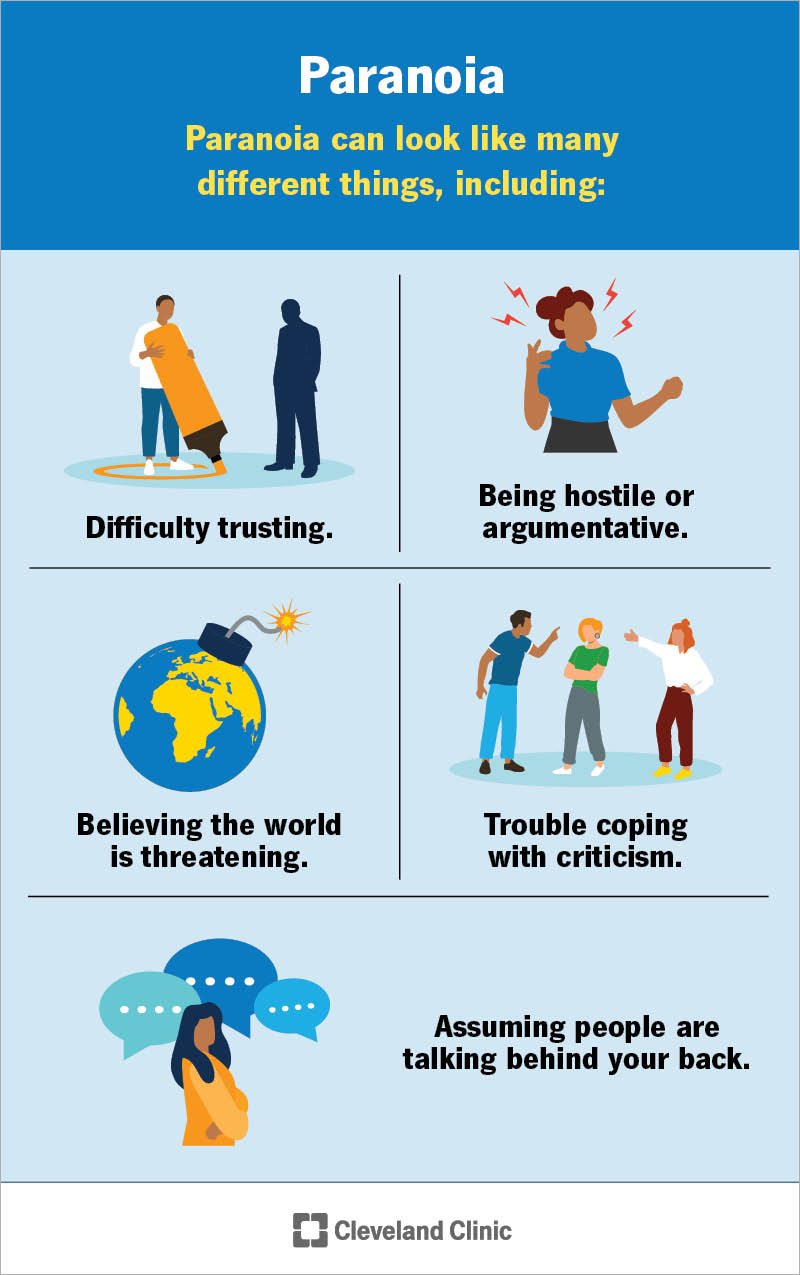Paranoia involves being overly suspicious and thinking others are out to harm you. Feeling some paranoia every once in a while is normal. But severe paranoia can be a sign of psychosis and certain mental health conditions.

Paranoia is a way of thinking that involves feelings of distrust and suspicion about others without a good reason. It often involves thoughts that others are out to get you or are looking to harm you in some way. You can also have paranoid thoughts about threats to other people, your culture or society.
Paranoia varies in severity and can be temporary or long-lasting. It’s the most common symptom of psychosis — over 70% of people with psychosis have paranoia. But you can have mild paranoid concerns without having psychosis. In fact, mild paranoia is quite common in the general population.
Paranoia can be a type of delusion — an unshakeable belief in something untrue. Not all delusions are about feelings of being harmed or threats. For example, you might have a delusion that another person, often someone important or famous, is in love with you. This isn’t paranoia.
Paranoid thoughts tend to cluster into four subtypes:
In general, the severity of paranoia depends on how much:
Many people experience mild paranoia at some point in their lives. This is nonclinical paranoia. It’s temporary and isn’t overwhelming or distressing. You can rationally think through this type of paranoia.
Severe paranoia is rare. Healthcare providers consider persecutory delusions to be severe paranoia.
Paranoia can look like many different things, including:
Advertisement
Cleveland Clinic is a non-profit academic medical center. Advertising on our site helps support our mission. We do not endorse non-Cleveland Clinic products or services. Policy
Researchers don’t know the exact cause of paranoia. But they think certain factors may contribute to it, including:
Paranoia is a common part of psychosis, which is a state of being disconnected from reality. People with psychosis may have false beliefs about or experience things that aren’t real. Psychosis isn’t a condition. It’s a term that describes a collection of symptoms.
Moderate to severe paranoia can be a symptom of certain mental health conditions, including:
You may have heard the term “paranoid schizophrenia.” This is an outdated name for a subtype of schizophrenia. Experts no longer use or recognize this term. Instead, experts recognize schizophrenia as a specific disease, which is part of a spectrum of related conditions that involve psychosis.
Paranoia is often a part of schizophrenia. But you can have paranoid thoughts without having schizophrenia.
No, anxiety and paranoia are different. Anxiety causes fear, worry and a constant feeling of being overwhelmed. It’s characterized by excessive, frequent and unrealistic worry about everyday things, like job responsibilities, health or chores.
Anxiety is generalized worrying. Paranoia is more specific. It involves feelings of distrust and suspicion of others without enough evidence to support your concerns.
Another difference is that anxiety can be a diagnosable mental health condition, like generalized anxiety disorder or another anxiety disorder. Paranoia isn’t a specific mental health condition, but it can be a feature of one.
If you have mild to moderate paranoia without an underlying mental health condition, psychotherapy (talk therapy) may help. With the guidance of a mental health professional (like a psychologist), you can identify and change unhealthy emotions, thoughts and behaviors.
If you have an underlying mental health condition that’s causing paranoia, treatment varies based on the condition and its severity. It typically involves a combination of psychotherapy and medications, like anxiolytics and/or antipsychotic medications.
If you have severe paranoia and other severe symptoms of psychosis (like hallucinations), you may need to stay in a hospital until your symptoms stabilize.
If paranoia becomes long-lasting or more severe, it can cause significant distress and lead to issues like:
Because of this, it’s important to seek help if you or someone you know has persistent paranoia.
Advertisement
If paranoia is overwhelming your thoughts or negatively affecting your life, it’s important to see a healthcare provider or mental health professional.
People with severe paranoia may not want to see a healthcare provider due to feelings of mistrust and suspicion. If a loved one has paranoia, try to gently encourage them to seek medical help or ask your provider about how you can help them.
While it’s normal to have mild, short-term paranoia once in a while, if it interferes with your life or causes distress, you should seek help from a healthcare provider. They can help you navigate your thoughts and check to see if paranoia could be part of an underlying mental health condition.
Last reviewed on 02/07/2024.
Learn more about the Health Library and our editorial process.
Advertisement
Cleveland Clinic is a non-profit academic medical center. Advertising on our site helps support our mission. We do not endorse non-Cleveland Clinic products or services. Policy